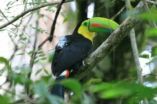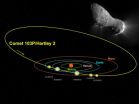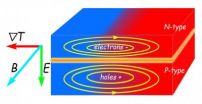Van de Vries Spice Corporation Selects O2 Food ERP by Escape Velocity Systems
2011-08-01
Escape Velocity Systems (EVS), a Boulder, Colorado based ERP innovation group is proud to announce today that Van de Vries Spice Corporation, the leading importer, processor and supplier of premium quality ingredients to the food manufacturing, bakery supply and food distribution industries, has selected EVS to provide them with the next generation of process manufacturing software designed specifically for today's food manufacturers.
According to Tom Schmidt, Vice President of Sales & Client Services, "We were looking for more control on the manufacturing side ...
Toucans wearing GPS backpacks help Smithsonian scientists study seed dispersal
2011-08-01
Nutmeg-loving toucans wearing GPS transmitters recently helped a team of scientists at the Smithsonian Tropical Research Institute in Panama address an age-old problem in plant ecology: accurately estimating seed dispersal. The tracking data revealed what scientists have long suspected: toucans are excellent seed dispersers, particularly in the morning. Also, for the first time, the data enabled researchers to create a map of the relative patterns and distances that toucans distribute the seeds of a nutmeg tree.
The reproductive success of any fruiting plant depends upon ...
Beynon Sports Surfaces to Resurface Stanford University's Track and Field Facility
2011-08-01
Finding the perfect athletic surface can oftentimes be difficult, especially for a sport like track and field that has multiple variables to consider when selecting a product. Coaches and athletes have always wanted their athletic running surfaces to be both training and competition friendly, unfortunately, more often than not they had to compromise by installing a surface that was either too hard to train on or too soft to compete on. The challenge lies in the fact that both sprinters and long distance runners use the track and have very different desires for the athletic ...
Research reveals why hedge funds are an unlikely large source of systemic risk
2011-08-01
NEW YORK – July 28, 2011 – The Journal of Financial Economics recently published a paper by Andrew Ang, Chair, Ann F. Kaplan Professor of Business and Chair, Finance and Economics Division at Columbia Business School; Sergiy Gorovyy, PhD candidate, Columbia Business School; and Gregory B. van Inwegen, Head of Quantitative Research/Managing Director for Tailored Portfolio Group of Citi Private Bank, that was the first paper to formally investigate hedge fund leverage using actual hedge fund ratios. Contrary to popular belief, the researchers found that hedge funds, in general, ...
SAP Professional Journal Posts New Case Study - "How a Pharmaceutical Company Reduced Its Business Downtime"
2011-08-01
SAPexperts announces a new Case Study, "How a Pharmaceutical Company Reduced Its Business Downtime" available in their SAP Professional Journal Expert knowledgebase.
This Case Study focuses on a pharmaceutical company that implemented much cheaper conventional methods instead of near zero downtime (NZDT) in order to be able to stay within its maximum tolerable business downtime. Conventional methods are provided through SAP standard tools that are either delivered within a product such as SAP R/3 or SAP ERP Central Component, or obtained through SAP.
In ...
Study: Iraq must overcome logistical, political challenges to become oil leader
2011-08-01
Iraq's large oil-production potential could put it in a position to vie for leadership with Saudi Arabia in the world oil scene in the coming decades. But a new energy study released today by Rice University's Baker Institute for Public Policy finds that in the near term, both Baghdad and Riyadh may have difficulty meeting rising demand for oil.
The study, "Iraqi Oil Potential and Implications for Global Oil Markets and OPEC Politics," argues that ambitious targets set by the government of Iraq may not be reachable in the short-to-intermediate term while international ...
The role of relaxation in consumer behavior
2011-08-01
NEW YORK – July 28, 2011 – A forthcoming paper in the American Marketing Association's Journal of Marketing Research by Professor Michel Tuan Pham, Kravis Professor of Business, Marketing, Columbia Business School; Iris W. Hung, Assistant Professor of Marketing, NUS Business School, National University of Singapore; and Gerald J. Gorn, Wang Seng Liang Professor of Business, Marketing Area Chair Professor at the School of Business, Faculty of Business and Economics, the University of Hong Kong, finds that states of relaxation consistently increase the monetary valuations ...
Minicom Showcases High Security Remote Management Solutions For Government Data Centers at LandWarNet 2011 in Tampa
2011-08-01
Minicom Advanced Systems will introduce new releases of AccessIT , their flagship Remote Access Management solution, and their award winning IP KVM switches. Says Rami Sasson, EVP, North America, "We are excited to show government IT people how remote access management and KVM help them increase security in their data centers, giving them the confidence to move to the cloud at a minimal investment, thanks to Minicom's unique open-vendor approach".
Remote Access Management (RAM) is a solution to a problem that is challenging data center managers. As organizations ...
Antioxidants of growing interest to address infertility, erectile dysfunction
2011-08-01
CORVALLIS, Ore. – A growing body of evidence suggests that antioxidants may have significant value in addressing infertility issues in both women and men, including erectile dysfunction, and researchers say that large, specific clinical studies are merited to determine how much they could help.
A new analysis, published online in the journal Pharmacological Research, noted that previous studies on the potential for antioxidants to help address this serious and growing problem have been inconclusive, but that other data indicates nutritional therapies may have significant ...
The brain's connectome -- from branch to branch
2011-08-01
The human brain is the most complex of all organs, containing billions of neurons with their corresponding projections, all woven together in a highly complex, three-dimensional web. To date, mapping this vast network posed a practically insurmountable challenge to scientists. Now, however, a research team from the Heidelberg-based Max Planck Institute for Medical Research has developed a method for tackling the mammoth task. Using two new computer programs, KNOSSOS and RESCOP, a group of over 70 students mapped a network of more than 100 neurons – and they did so faster ...
DERMagic Awarded 1st Place for Grooming Products in Pet Product News International 2011 'Retailers' Top Pick'
2011-08-01
DERMagic Skin Care for Animals (www.DERMagic.com) today announced its popular and recently introduced Organic Skin Rescue Shampoo Bar has won 1st Place in the Pet Product News International "2011 Retailer's Top Pick" Awards in the Grooming Products category. Created by the editors at Pet Product News International to identify new products retailers would most like to see on their store shelves, the 2011 Retailers' Top Picks Awards presented product in 14 categories and asked pet specialty retailers to vote for their favorite three within each category.
"We ...
Humabs discovers the first antibody to neutralize both group 1 and group 2 influenza A viruses
2011-08-01
BELLINZONA (Switzerland) – July 28, 2011 – A paper published today in the scientific research journal Science, describes a novel, proprietary monoclonal antibody (FI6) discovered in a collaboration between Humabs BioMed SA, the Institute for Research in Biomedicine ("IRB") and the UK Medical Research Council (MRC). FI6 is the first neutralizing antibody that targets all 16 hemagglutinin subtypes of influenza A and represents an important development in the treatment of severe cases of flu, and in finding a universal flu vaccine. The paper also discusses Humabs' high throughput ...
Oral interferon may prevent and control avian influenza virus infection
2011-08-01
New Rochelle, NY, July 28, 2011—Avian influenza virus is a threat to the commercial chicken industry and, with its recent rapid spread across China, has also shown the ability for transmission from chickens to humans and other mammals. In an article in Journal of Interferon & Cytokine Research, a peer-reviewed journal published by Mary Ann Liebert, Inc., Chinese researchers report that oral chicken interferon-alpha may significantly reduce influenza virus levels when given either preventively or therapeutically. The article is available free online at www.liebertpub.com/jir
Chickens ...
Endorsements matter but voters are wise to media bias
2011-08-01
PROVIDENCE, R.I. [Brown University] — Newspaper endorsements for presidential candidates can influence voting decisions, according to newly published research co-authored by Brown University economist Brian Knight. The paper, co-authored by Chun Fang Chiang, demonstrates that voters are more likely to support the recommended candidate following a newspaper's endorsement, but any degree of influence depends on the credibility of the paper's pick. The findings are published in The Review of Economic Studies.
The researchers take into account that newspapers are potentially ...
Elusive prey
2011-08-01
WORCESTER, Mass. – Escape responses are some of the most studied behaviors by neurobiologists who want to understand how the brain processes sensory information. The ability to evade predators plays a vital role in the process of natural selection. Animals explore their environment to find food, find mates and locate new habitats, and have developed distinct escape responses to avoid predators, thereby increasing their chances for survival. Yet there are few examples that illustrate a complete understanding of the basic biological mechanisms of behavior with its ecological ...
Geographic analysis offers new insight into coral disease spread
2011-08-01
GAINESVILLE, Fla. — In the last 30 years, more than 90 percent of the reef-building coral responsible for maintaining major marine habitats and providing a natural barrier against hurricanes in the Caribbean has disappeared because of a disease of unknown origin.
Now a University of Florida geographer and his colleagues applied Geographic Information Systems, known as GIS — as well as software previously used to examine human illness — to show where clusters of diseased coral exist. Their findings, published this month in the journal PLoS One, may help scientists derive ...
NASA identifies the areas of Tropical Storm Muifa's strength
2011-08-01
The strongest thunderstorms that make up tropical storm Muifa are on the storm's eastern and southern sides, according to infrared imagery from NASA's Aqua satellite. The northern side is being weakened by a nearby weather system.
Tropical Storm Muifa is moving through the western North Pacific Ocean, and had strengthened during the early morning hours of July 28. On July 27, it was tropical depression 11W and winds have since increased to 40 knots (46 mph/74 kmh).
When NASA's Aqua satellite passed over Tropical Storm Muifa the Atmospheric Infrared Sounder (AIRS) instrument ...
NASA eyes Tropical Storm Nock-Ten's heavy rains for Hainan Island and Vietnam
2011-08-01
Infrared satellite imagery from NASA's Aqua satellite shows bands of strong thunderstorms wrapping around the center of Tropical Storm Nock-Ten as it makes its way through the South China Sea and two landfalls on Hainan Island and in Vietnam.
Bands of strong thunderstorms that make up tropical storm Nock-ten were visible in an infrared image captured on July 28 by the Atmospheric Infrared Sounder (AIRS) instrument that flies on NASA's Aqua satellite. The colder the cloud tops, the higher the thunderstorms and the stronger they are, and cloud top temperatures over a large ...
NASA measures wildfire pollution pour over Niagara Falls
2011-08-01
Water isn't the only thing pouring over Niagara Falls. Pollution from fires in Ontario, Canada is also making the one thousand mile trip, while being measured by NASA's Aqua satellite.
One instrument that flies aboard two of NASA's satellites has provided two views of the pollution from the fires in Ontario. The Moderate Resolution Imaging Spectroradiometer, or MODIS instrument, flies onboard NASA's Aqua and Terra satellites. MODIS has provided a visible look at the smoke and pollution that has spread over Niagara Falls and east to Nova Scotia.
As of July 20, the Canadian ...
Cash Advances US Provides Fast Cash Loans Online With No Credit Check
2011-08-01
Less-than-perfect credit score can wipe off any opportunity to get some cash you need at the moment as most of the lenders consider people with bad credit history as high-risk borrowers. However, Cash Advances US offers particular cash loans with no credit check which are available online. The service was actually designed specially for consumers with damaged credit report who often face troubles applying for some extra money.
It's fast and simple to take out online payday advance loans performed by the company as the application process is held totally on the Internet. ...
Using a 'systems biology' approach to look under the hood of an aggressive form of breast cancer
2011-08-01
SEATTLE – Using a "systems biology" approach – which focuses on understanding the complex relationships between biological systems – to look under the hood of an aggressive form of breast cancer, researchers for the first time have identified a set of proteins in the blood that change in abundance long before the cancer is clinically detectable. The findings, by co-authors Christopher Kemp, Ph.D., and Samir Hanash, M.D., Ph.D., members of Fred Hutchinson Cancer Research Center's Human Biology and Public Health Sciences divisions, respectively, are published online ahead ...
SOHO watches a comet fading away
2011-08-01
On Nov. 4, 2010, NASA's EPOXI spacecraft came within 450 miles of Comet Hartley 2, a small comet not even a mile in diameter, which takes about six and a half years to orbit the sun. Designated officially as 103P/Hartley 2, the comet thus became the fifth for which scientists have collected close-up images.
But the comet was also observed from another spacecraft: the Solar and Heliospheric Observer (SOHO), better known for its observations of the sun. Together, the two returned data about what appears to be an irregular comet, belching chunks of ice and losing water at ...
Fresh Produce Clothing's Summer-Fall Collections Feature Unique Pieces of Wearable Works of Art
2011-08-01
Fresh Produce customers can make an artful statement when they wear the eclectic prints featured in its latest collections of effortless and spirited looks. The inspired prints are available in a variety of new styles and fabrications from cool cotton voile to comfy cotton jersey and versatile rayon-lycra.
This summer's standout print is the Blue Tahitian Flower. Fresh Produce women adore this romantic watercolor-inspired motif. Its look and feel is "pure summer" with beautiful tropical flowers captured in soft, watery hues and translated to new chic tunics, ...
An unexpected clue to thermopower efficiency
2011-08-01
Scientists at the U.S. Department of Energy's Lawrence Berkeley National Laboratory (Berkeley Lab) and their colleagues have discovered a new relation among electric and magnetic fields and differences in temperature, which may lead to more efficient thermoelectric devices that convert heat into electricity or electricity into heat.
"In the search for new sources of energy, thermopower – the ability to convert temperature differences directly into electricity without wasteful intervening steps – is tremendously promising," says Junqiao Wu of Berkeley Lab's Materials ...
Boloco Earns Another 'Green' Star
2011-08-01
Back in March 2008 boloco, a chain of inspired burrito restaurants, became the first fast-casual chain in New England to become a Certified Green Restaurant by the Green Restaurant Association (GRA). But when boloco found out an even higher level of certification could be achieved - well, let's just say they reached for the stars. Boloco is now the first chain* of restaurants to become a 2 Star Certified Green Restaurant across all of their 17 locations.
For each of boloco's 17 locations to earn the GRA's rigorous two-star certification, they had to be inspected and ...
[1] ... [7026]
[7027]
[7028]
[7029]
[7030]
[7031]
[7032]
[7033]
7034
[7035]
[7036]
[7037]
[7038]
[7039]
[7040]
[7041]
[7042]
... [8800]
Press-News.org - Free Press Release Distribution service.









